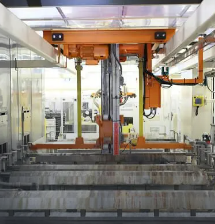Settling for Soft Skills? You’re Part of the Problem
Don’t dismiss the importance of hard skills in favor of the soft ones. Instead, pursue initiatives that instill both hard skills and soft skills into the available workforce.
#management #workforcedevelopment
It’s a common mantra among business and industry leaders: “What we really need are soft skills. Give me someone who can stay off drugs, come to work every day and take a little bit of direction, and we’ll teach them the hard skills they need to be successful in our business.” Recently I found myself reflecting a bit on why we have become so quick to dismiss the importance of hard skills in favor of soft skills.
For clarity, soft skills can be likened to personality traits and habits that make an individual an effective team member. A 2016 survey of manufacturers performed by LAB Midwest of Mequon, Wisconsin, identified soft skills such as taking initiative, being drug-free, respectful and punctual as those most sought after by industrial employers. Hard skills, by contrast, are job-specific knowledge and experience: the ability to program or operate a powder gun or PLC, operate a fork lift, drive a semi or weld, for instance.
To generalize, we can place any employee or candidate into one of three categories. The first is comprised of candidates who have both the requisite hard and soft skills. The second includes candidates with desired hard skills but lacking soft skills, and the third category is made up of individuals with few hard skills but decent soft skills.
It would be quite reasonable to conclude that most employers, given the choice, would select a candidate from the group possessing both the necessary hard and soft skills to fill an open position. It would be equally reasonable to conclude that individuals in the group that exhibits few hard or soft skills would be the least desirable group, leaving the group with few hard skills but appropriate soft skills in the middle.
If individuals in the group possessing both hard and soft skills would be the obvious preference, why then have many employers become so quick to proclaim their desire to fill their ranks with people who solely exhibit soft skills by stating that “we’ll teach you the rest”?
The obvious answer is that the dearth of hard skills in today’s marketplace has led employers to settle for soft skills only, as an employee who stays off drugs, comes to work every day and has the capacity to be led is better than one who doesn’t exhibit these behaviors at all.
The word “settle” is used intentionally, as its accuracy is curious. Industrial employers are unaccustomed to settling.
We live in a world where on-time delivery in the near-perfect range is the norm, parts-per-million rejects in sub-10 territory is expected and impeccable service is the standard. Consistently improving efficiency, reducing cost and innovating processes are hallmarks of our existence. We demand these not just of our team members, but equally of our suppliers and business partners. Providing us with less than ideal performance, quality or service can be grounds for severing a relationship.
Yet when it comes to recruiting team members, we have lulled ourselves into the belief that choosing from a field of candidates incapable of performing the skilled work we require is perfectly alright. Ditch the drugs, come to work every day and we’ll teach you the rest. Have we gone mad?
The truth is that we are doing the best we can with what the labor market has to offer. In the absence of recruitable hard skills, we have no choice but to hire the best from which we have to choose, and if that means soft skills, we do what we must.
Industrial employers beware, however. Our message that we will employ the candidates with decent soft and few hard skills is being misconstrued. Some public policy makers and educators now openly parrot what we are telling them and some have reached the erroneous conclusion that all we really want are soft skills. This presents a dangerous environment in which our insistence on the value of soft skills is used to argue against preparing the workforce of the future with hard ones.
Give me the choice between someone possessing only soft skills and someone who has these but can also operate finishing equipment, program a PLC, operate production equipment or drive a truck, and I know which one I will pick. The solution is to pursue initiatives that instill both hard skills and soft skills into the available workforce, not settle for one at the expense of the other.
When tempted to tell the world you’ll “settle” for the candidate with soft skills only and teach the rest, be sure to state just as emphatically that your preference is for hard and soft skills, if only you could find candidates that possess both.
Originally published in the March 2017 issue.
RELATED CONTENT
-
Valence Surface Technologies Sold to Investment Groups
ATL Partners and British Columbia Investment Management purchase Texas-based Valence.
-
Understanding and Managing White Spots on Anodized Aluminum
Having trouble with spotting defects when anodizing? Taj Patel of Techevon LLC offers a helpful overview of the various causes of white spots and potential solutions.
-
Managing Stacked Tolerances with PTFE Lubricants
PTFE coatings allow surgical instruments to overcome static friction.
















